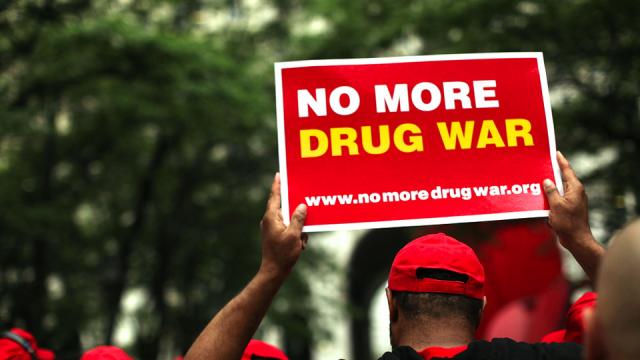
Marijuana — it’s one of the primary reasons why California experienced a stunning 20 percent drop in juvenile arrests in just one year, between 2010 and 2011, according to provocative new research.
The San Francisco-based Center on Juvenile & Criminal Justice (CJCJ) recently released a policy briefing with an analysis of arrest data collected by the California Department of Justice’s Criminal Justice Statistics Center. The briefing, “California Youth Crime Plunges to All-Time Low,” identifies a new state marijuana decriminalization law that applies to juveniles, not just adults, as the driving force behind the plummeting arrest totals.
After the new pot law went into effect in January 2011, simple marijuana possession arrests of California juveniles fell from 14,991 in 2010 to 5,831 in 2011, a 61 percent difference, the report by CJCJ senior research fellow Mike Males found.
“Arrests for youths for the largest single drug category, marijuana, fell by 9,000 to a level not seen since before the 1980s implementation of the ‘war on drugs,’” Males wrote in the report, released in October.
In November, as Males blogged recently, voters in Washington state and Colorado voted to legalize but regulate marijuana use, like alcohol, for people over 21. California’s 2010 law did not legalize marijuana, but it officially knocked down “simple” possession of less than one ounce to an infraction from a misdemeanor — and it applies to minors, not just people over 21. Police don’t arrest people for infractions; usually, they ticket them. And infractions are punishable not by jail time, but by fines — a $100 fine in California in the case of less than one ounce of pot.
“I think it was pretty courageous not to put an age limit on it,” said Males, a longtime researcher on juvenile justice and a former sociology professor at the University of California at Santa Cruz.
Arresting and putting low-level juvenile offenders into the criminal-justice system pulls many kids deeper into trouble rather than turning them around, Males said, a conclusion many law-enforcement experts share.
California’s 2010 law still makes it a misdemeanor for anyone over 18 to possess less than an ounce of pot on school grounds, Males noted. For an adult, that’s an offense punishable by a $500 fine, ten days in a county jail or both. A minor caught on school grounds with less than an ounce of marijuana is also guilty of a misdemeanor and faces a $150 fine for the first offense, a $500 fine for a second offense and commitment to youth detention for not more than 10 days.
Before the passage of the 2010 law, Californians caught with less than an ounce of pot were arrested by the thousands every year, ultimately facing a fine of $100 fine and, under certain conditions, referral to drug treatment or education. Many of those arrested were booked, others were released but required to appear in court. They could demand a trial. Strained courts had to take up time ordering diversion treatment programs — a waste of court resources, supporters of a reform said.
Backed by the California District Attorneys Association, the new pot law — passed by state lawmakers — did away with prior requirements that pot offenders be referred to treatment and now allows them to pay a $100 fine akin to that for jaywalking. When Gov. Arnold Schwarzenegger signed the law, he noted that simple pot possession in California was already “an infraction in everything but name.”
Males said he suspects that many of the 5,831 marijuana arrests of juveniles in California last year may have occurred on school grounds. He doesn’t have data yet to check his theory, however.
In his police briefing, Males also notes that juvenile arrests in California were the lowest ever recorded since statewide statistics were first compiled in 1954. The decline, Males said, wasn’t due just to fewer marijuana arrests.
Drug-related juvenile arrests overall fell by 47 percent between 2010 and 2011. Violent crime arrests fell by 16 percent; homicide arrests by 26 percent; rape arrests by 10 percent; and property-crime arrests by 16 percent. Nationwide, according to the FBI Uniform Crime Reports, arrests of juveniles for all offenses decreased 11.1 percent in 2011 when compared with the 2010 number; arrests of adults declined 3.6 percent.
3 WAYS TO SHOW YOUR SUPPORT
- Log in to post comments











